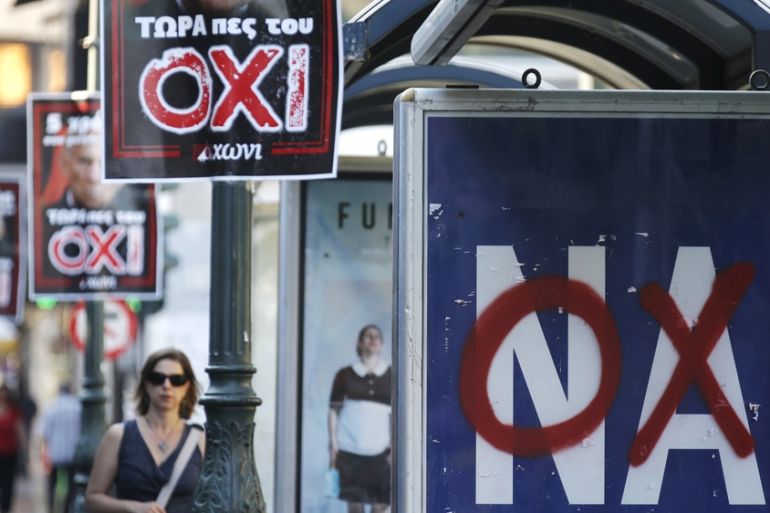Poll shows Greeks split on referendum on austerity
Almost 41.5 percent say they will vote in favour of latest bailout proposals while 40.2 percent say they will vote “No”.

Greeks are almost evenly split over this weekend’s crucial referendum, with 41.5 percent saying they will vote in favour of accepting the latest bailout proposals and 40.2 percent saying they will vote “No”, an opinion poll shows.
Friday’s poll showed that 10.9 percent remained undecided, while the rest said they would abstain or leave their ballots blank.
Keep reading
list of 4 items‘We need you’: Solomon Islands’ support for US agency’s return revealed
Why are nations racing to buy weapons?
Parallel economy: How Russia is defying the West’s boycott
The difference between the “Yes” and “No” votes is well within the margin of error, leaving any outcome possible.
The poll, conducted by ALCO for To Ethnos newspaper, interviewed 1,000 people nationwide on June 30-July 1 and has a margin of error of 3.1 percent.
|
|
Prime Minister Alexis Tsipras called for the referendum last weekend, asking Greeks to decide whether they should accept creditor reform proposals in return for vitally needed bailout funds. He is advocating a “No” vote.
But those proposals are no longer on the table after negotiations with European creditors broke down last weekend, and Greece’s bailout expired on Tuesday, meaning the country no longer has access to the rescue loans.
Opponents do not believe Tsipras and say he is risking the country’s future – asking voters to weigh in on an already expired bailout offer.
The “Yes” campaign says the referendum is in fact a vote on whether Greece wants to remain in the eurozone and in Europe.
“They are making a serious mistake. Because the world will consider a ‘No’ vote to be a withdrawal from the heart of Europe – the first step towards euro exit,” former conservative Prime Minister Costas Karamanlis said, making his first public speech in six years to endorse the “Yes” campaign.
The government rejects this as scaremongering, saying a “No” vote will put it in a better bargaining position and help Greece win a new deal with the eurozone’s rescue mechanism that would include terms to make the country’s $355bn national debt sustainable.
The International Monetary Fund on Thursday warned that Greece needs $55bn and massive debt relief over the next three years to stabilise its finances. It said that Greece’s finances have deteriorated because Athens has been slow in enacting economic reforms.